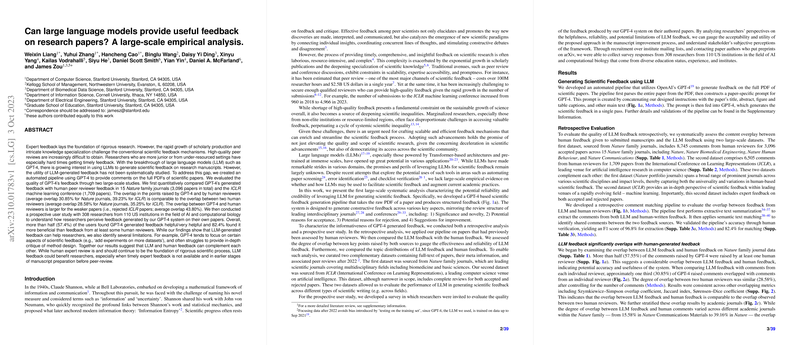Overview of "Can LLMs provide useful feedback on research papers? A large-scale empirical analysis"
This paper addresses the utility of LLMs, specifically GPT-4, in providing feedback on scientific manuscripts, a burgeoning area of interest in computational science. As scholarly output grows and expertise becomes deeply specialized, obtaining high-quality, timely peer reviews has become increasingly challenging. The paper undertakes a structured exploration of using LLMs to autonomously generate feedback on research papers and employs rigorous empirical methods to assess the viability of these models as a complement to traditional human review.
Methodology and Evaluation
The authors developed a sophisticated automated pipeline that leverages GPT-4 to generate feedback on scientific manuscripts. This system processes a paper's PDF and produces structured evaluations. They conducted retrospective and prospective analyses to compare GPT-4-generated feedback against human feedback.
In the retrospective paper, a significant dataset was employed, including papers from 15 Nature family journals and ICLR, encompassing thousands of papers and reviewer comments. The similarity of comments between GPT-4 and human reviewers was assessed, revealing overlap rates of 30.85% for Nature journals and 39.23% for ICLR, closely aligned with inter-human reviewer overlaps.
A prospective paper involving 308 researchers explored user perceptions of GPT-4 feedback. Over half of the respondents found GPT-4 feedback beneficial, and a substantial proportion viewed it as more helpful than some human reviews.
Key Findings
- Feedback Overlap: GPT-4's feedback showed a level of overlap with human reviewers comparable to that between two human reviewers, indicating that the model can mimic human-like feedback to a degree.
- Paper-Specific Feedback: Shuffling experiments demonstrated that GPT-4 feedback is specific rather than generic, as shuffling feedback between papers drastically reduced overlap.
- User Perception: Many researchers found GPT-4 feedback useful, particularly valuing its ability to highlight overlooked perspectives.
- Comment Emphasis: The paper noted differences in focus, with GPT-4 offering more comments on implications but fewer on novelty, suggesting variability in the depth and scope of LLM feedback.
- Potential and Limitations: While LLM feedback can complement human review, it lacks depth in critiquing methodologies and providing actionable insights, underscoring the necessity of human expertise in scientific evaluation.
Implications and Future Directions
The integration of LLMs in scientific feedback mechanisms offers promising avenues for enhancing manuscript evaluation, particularly in scenarios where human reviews are delayed or inaccessible. This capability could democratize access to scientific feedback, aiding under-resourced researchers by providing immediate, albeit general, feedback during early manuscript stages.
Future research should focus on refining LLMs to generate more nuanced and specific feedback, potentially through integrating domain-specific training or hybrid models combining human expertise with machine efficiency. The responsible application of LLMs in scientific review remains pivotal, ensuring they augment rather than replace the nuanced critique achieved through human expertise.
Conclusion
The paper contributes significantly to the discourse on AI's role in scientific processes, suggesting that while LLMs like GPT-4 hold potential in enhancing accessibility to feedback, human reviewers remain indispensable. The paper advocates for a balanced approach, leveraging LLMs for preliminary feedback while preserving the integral role of human insight in the scientific review process.
